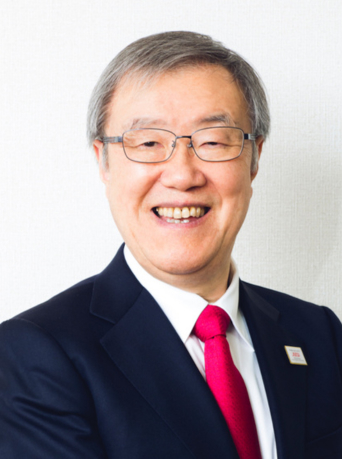In a recurring column for Nikkei Business Online, President Haruaki Deguchi writes about his time as the President of APU. This entry from September 3, 2018 recounts President Deguchi’s experience being nominated and selected for the position.
Why did I assume the presidency of APU?
“President Deguchi, do you have anyone you know in Malawi?”
One day, a student whose graduation was just around the corner appeared unexpectedly at the Office of the President. Asked about the reason why he came to my office, he answered that he would live in Malawi for ten years after his graduation.
This student went to the African country when he was a sophomore and was impressed by how kind and warm-hearted the local people were. But Malawi lacked a main industry and was a very poor country. He wanted to work in Malawi and liven up the country. His dream was to send three Malawian students to APU each year. He said, “I’ve heard that you have a large circle of connections. I hope you can introduce someone who has experienced Malawi to me.”
In response to his request, I introduced two acquaintances who had lived in Malawi to him. APU has many such unique students.
I took office as President of APU in January 2018.
It was in November 2017 that an official announcement about my selection was made. This announcement seemed to be a great surprise to people who knew me.
In fact, although I stepped down as director of Lifenet Insurance Company in June 2017, I switched from the life insurance business I had engaged in for nearly 45 years to the educational world, a completely different field, even after reaching the age of 70.
After the initial announcement, I was often asked if I had been interested in education. I speculate that many people expected me to enter the educational world someday because I had written books and had given lectures for young people.
But to be honest, I had never thought of it.
Just like when I had joined Nippon Life Insurance Company as a new graduate, and when I had decided to found Lifenet Insurance Company, encouraged by the investor Mr. Mamoru Taniya, I just gave myself to a large tide.
What was the tide? Everything started from an email I received from a staffing agency in September 2017.
My dead tree candidacy
According to the email from a headhunter at the staffing agency, I was nominated for president of a university by several people. I did not know the details. But when asked to a meeting, I accepted his offer to have a talk at the agency’s office out of curiosity.
At the office, I was told that the university was APU.
In fact, some of my friends said many times: “APU is a very interesting university.”
But I just heard it by name at a party and did not remember it well. Anyway, I just remembered the phrase interesting university.
Fundamentally speaking, it was probably the first public recruitment of a university president in Japan. When I heard this, I got the favorable impression that it was a very unique attempt.
But when I asked the recruiter about the requirements for the position, he emphasized that the first requirement was holding a doctorate and the second was having a good command of English.
You may wonder why the president is required to hold a doctorate. Half of APU’s teachers are of foreign nationalities and APU is one of the universities where many teachers hold doctorates. I thought that the president had to have doctorate-level academic knowledge as the top manager of those teachers. Technically, the position’s requirements asked for a person with academic knowledge suited to the post.
Meanwhile, I did not hold even a master’s degree. As for English, it was a quarter of a century ago that I worked in London and I had the least command of the language. When I heard the requirements, I thought it was fine for me to be added to the candidate list, but it was none of my business.
When I told my family the story back home, they said, “Public recruitment? It would look bad unless they try to invite many people. As the proverb goes, ‘Even a dead tree may brighten a mountain’” That is to say: anything is better than nothing. What my family said was somewhat convincing to me.
Then, I decided to accept the offer for an interview, thinking that I was a dead tree candidate.
The first interview was held in Tokyo in October 2017. Thinking that I was just a “dead tree,” I spoke frankly about issues that Japanese universities faced.
Following this interview, I was invited to go to see the campus in November. Thinking that it was certainly unnatural that I was added to the list without visiting the university, I flew to Beppu City, Oita.
It turned out that APU was an even more exciting and inspiring place than I had expected.
A young United Nations, the diversity of the selection committee, and a grand vision.
As soon as I arrived on campus, I had lunch at the student cafeteria. The university sits on a mountain, so I had nowhere to eat but there. As soon as I entered the cafeteria, I was really surprised to see students from many countries and regions around the world talking with great enthusiasm.
It was entirely different from the university student cafeteria I had known. It struck me intuitively, that this is a young United Nations, or what I like to call a small globe.
Of about 6,000 students, more than 3,000, or 50.4%, are foreign students. They are from about 90 countries and regions, totally different in skin colors, languages, and religions. I already knew these figures about APU. But when I actually saw the scene just in front of me, I was overwhelmed by this young United Nations.
I was quickly intrigued by the university, thinking that there would be no such diverse educational environment like this in any other place in Japan.
I am a compulsive traveler. I have wandered around the world for two weeks each at least twice a year since I was young. Although I am now 70 years old, the countries and regions I have visited to date add up to at most 80.
The number of the countries and regions of origin of the students gathering at the cafeteria was larger than that of the places I had previously travelled around in my life. I thought it was great.
I was also struck by the fact that the members of the presidential selection committee explained the reason: diversity itself.
The Committee consisted of ten members—five APU faculty, two school officials, and two alumni, headed by a Vice-President. The committee included four foreigners and three women. This met the female management rate of 30% based on the Japanese government’s Act on Promotion of Women’s Participation and Advancement in the Workplace. I guess that even large corporations’ nomination and remuneration committees are hardly as advanced in diversity as that. I hesitate to say it, but I think that they consist of many old men.
This alone made me convinced that APU was an advanced university.
APU’s vision was also compelling.
In 2015, APU formulated the APU2030 Vision. Under the slogan of “Individuals who experience APU’s unparalleled Global Learning Community will develop the power to change the world,” this vision is a grand one aimed at developing students who will disperse across the globe, taking on challenges in each field and changing the world.
The United Nations drew up a vision for 2030 called the Sustainable Development Goals (SDGs). But I wonder how many companies and universities in Japan today have visions firmly in sight for 2030. I strongly felt that APU had a high-level point of view.
A young United Nations, the diversity of the selection committee, and the grand 2030 Vision.
These three elements were so strongly impactful that I came to admire APU very quickly. I went down from the mountain campus in Beppu thinking, “After coming back to Tokyo, I will tell every person I meet how interesting APU is. I will support APU.”
“We have already selected you as the President of APU”
In mid-November 2017, the headhunter invited me to have breakfast at a hotel. Because I had not been informed of the proceedings of the selection at all, I expected that he would report that another candidate had been selected and would express his appreciation to me for going all the way to Beppu. I headed to the hotel in a relaxed mood and wearing plain clothes.
In the lobby of the hotel, the headhunter told me that he had reserved a room.
I thought, “I get it. This isn’t news you break to someone in public. He’s trying to be cautious.” After being guided into the room and opening the door, I saw five people lined up.
I felt like I had just wandered in to a surprise party. One of the members of the selection committee said, “We have already selected you as the president of APU. We hope you will accept.” He added, “These are the secretary and the official in charge of public relations who are going to work for you beginning today. I am pleased to announce that you will assume office at the start of next year.”
I thought I had no other choice but to accept the offer. The mood prevented me from declining the offer. I thought, all I could do is go with the tide.
At that time, I remembered the moment when I had decided to found Lifenet Insurance Company.
When I was talking about insurance to Mr. Mamoru Taniya, he said about fifteen minutes after we had met, “Let’s found a new insurance company.” I made a quick decision, saying, “Okay.”
I remembered that I had been at a hotel on that occasion as well.
Charles Darwin, whom I respect very much, said, “It is not the strongest of the species that survives, nor the most intelligent that survives. It is the one that is most adaptable to change.” As Darwin pointed out, whatever change you face in the world, it depends on luck and adaptation. No one knows what will happen.
Based on this line of reasoning, I, a Darwinist, had long thought that all human beings could do was to give themselves to river streams. Consequently, I also just gave myself to that tide in the face of a great change when I became 70 years old. I caused a lot of people trouble in adjusting my engagements scheduled for the following year.
After leaving the hotel, the first thing I did was to make a phone call to Mr. Iwase, the President of Lifenet Insurance at that time. I had not told anyone about being nominated as a candidate for APU president until then. I was just a dead tree, after all. Mr. Iwase seemed to be a little bewildered.
But soon afterward, he said, “We cannot do anything about it.”
This is probably because he understood my character well. This isn’t the end of the story. Because the university staff told me not to reveal the committee’s decision until the press conference, I remained silent. But immediately after the phone call, Iwase seemed to tell Lifenet Insurance’s directors about it. After the information was released, my secretary said, “Because you remained obstinately tight-lipped, I had difficulty keeping things consistent.”
I would like to add that when I came back home and told my family that I would assume the presidency of APU the following year, they laughed, saying, “They picked the dead tree.” Then, they added quickly, “Stay healthy and work hard.” I stopped myself from saying, “Will you come along with me?”
Translated by Kazuya Hirai











